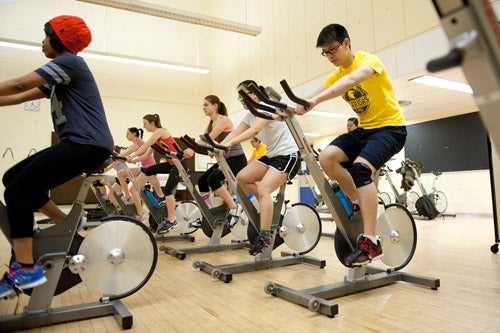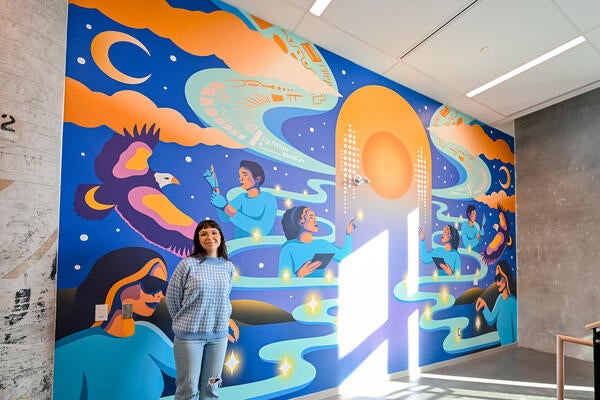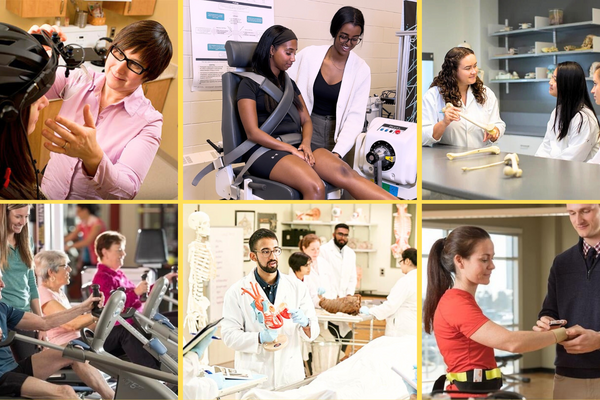Student wellness: a campus priority
Find out how the Student Wellness Campaign provides support for campus initiatives to keep students healthy
Find out how the Student Wellness Campaign provides support for campus initiatives to keep students healthy
By Staff Office of AdvancementWe all feel it: We’re pressed for time. We have a lot of commitments. Some nights, it’s hard to put down our phones and go to sleep.
For students, add the pressure of assignments and exams. “You always have to make sacrifices in some areas,” says David Huang, a former Student Engagement Coordinator with Athletics and Recreational Services. “Often, you sacrifice your own health.”
Having just completed back-to-back co-op terms with Athletics, David’s thought a lot about how to help his peers make wellness a priority. His role was funded by the Student Wellness campaign, which received strong financial support from parents of Waterloo students. Their gifts enabled David to spend eight months planning and running campus programs.
Such responsibilities were part of what drew David to his role. “Essentially, I wanted to do it because I had a lot of control over my projects,” he says. “It was very relevant to my program, too. I study public health, and I figured that this job would be a great way for me to learn skills related to my field and apply what I learned in my program to our campus community.”

David Huang (right), a former Student Engagement Coordinator with Athletics and Recreational Services, participates in a cycle class on campus.
During his co-op, David oversaw Wellness Warriors, an initiative for students who want to make time for their health. Participants enroll in classes, clubs and drop-in games, and then share their experiences on social media.
David’s new program, Live Well, was implemented as a pilot project in the winter term. Over a seven-week period, students would track behaviours like brushing their teeth, getting sleep, exercising and talking to friends. To motivate students to stay involved, David enrolled them in teams of four and sent them weekly e-newsletters with videos and other resources.
“We’ve heard that the program has made students more aware of what they do on a day-to-day basis,” he says. “It’s also giving them more ideas about how to live a healthy lifestyle.”
David sees these efforts as part of an emerging discussion on physical and mental wellbeing. Waterloo has undertaken a number of other initiatives to engage students in such conversations, including Mental Health Wellness Day and Move Your Mind, a referral-based mental wellness program offered by Athletics and Health Services.
Students have told David about the impact these efforts have had on their lives.
“Sometimes I didn’t even need feedback to see their improvement,” he says. “Some of them had physical symptoms like muscle tension and insomnia at the beginning, and those symptoms declined because of their physical activity. In other cases, their energy for classes or life in general increased because of their participation in our programs.”
For more on Waterloo’s wellness initiatives, check out this video:
Discover how our supporters impact life at Waterloo in our Report on Giving.

Read more
Many Hearts, One Mind by Indigenous artist Alanah Jewell celebrates the act of creation shared by the Land and innovators in our community

Read more
From optometry and pharmacy to public health and therapeutics, Waterloo alumni are powering Canada’s health care sector

Read more
Here are the people and events behind some of this year’s most compelling Waterloo stories
The University of Waterloo acknowledges that much of our work takes place on the traditional territory of the Neutral, Anishinaabeg, and Haudenosaunee peoples. Our main campus is situated on the Haldimand Tract, the land granted to the Six Nations that includes six miles on each side of the Grand River. Our active work toward reconciliation takes place across our campuses through research, learning, teaching, and community building, and is co-ordinated within the Office of Indigenous Relations.